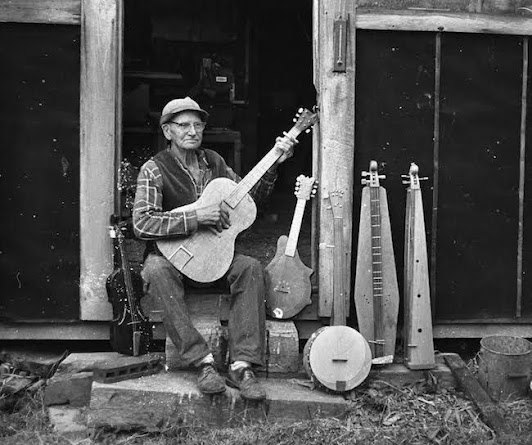October 1-31 is NATIONAL APPLE MONTH
Poetry about the beauty, heritage and history of the Blue Ridge Mountains of western North Carolina appear on this blog.
Saturday, September 28, 2024
NATIONAL APPLE MONTH
October 1-31 is NATIONAL APPLE MONTH
Thursday, September 19, 2024
APPALACHIAN MUSIC
Music was an important part of the Appalachian Mountains. This range of mountains reaches from Canada to Alabama along the eastern coast of the United States. I live in the Blue Ridge Mountains which is a section of Southern Appalachia.
The mountain dulcimer (beside the gentleman's photo) was played often by mountain people. Gordan Parris of Hayesville made Appalachian musical instruments. These instruments included the guitar, banjo, and the dulcimer. Gordan was regionally recognized for crafting fine musical instruments. I was fortunate to interview he and his wife at their mountain home off Cold Branch Road in Hayesville. He had several piles of wood drying in the yard that he had collected to craft his instruments.
The banjo was brought to Appalachia by the blacks. Although only 10% of the Blue Ridge was populated by African Americans, they also contributed to the rich musical heritage of this area.
Interestingly, the fiddle was frowned on by some religious leaders in the community. It was often played at barn dances. Some mountain preachers were opposed to dancing and thought the fiddle was associated with the "sin of dancing." Clogging and buck dancing were favorites of the Appalachians.
Ballads were brought from Ireland and Scotland to Appalachia. They were stories in songs. Most had a sad theme such as the traditional Scots-Irish ballad, "Barbara Allen." This is a sad love story where Barbara Allen rejected her fellow and he died of being lovesick for Barbara who refused to visit him on his deathbed when he called for her.
The ballads were passed down from one generation to another by word of mouth. Many of the Irish in the homeland, were not able to read, so they preserved the songs by singing them.
The churches contributed also to the musical heritage of the Blue Ridge. Christian Harmony music was sung without any music. John Wesley, Fannie Cosby and other great songwriters penned powerful songs that are still sung today in many congregations.
Many of the mountain people sang to help them overcome hardships. The black people often lifted songs of lament for the day they would be free as they picked cotton. Blue Ridge people gathered for singing at churches during the Great Depression in the 1920s to give them strength to make it through very trying times and poverty.
Music continues to lift the spirit of downtrodden people not only in Appalachia, but around the world. It's a universal language that binds people together in fellowship and worship of God.
by: Brenda Kay Ledford
Happy Valentine's Day
Each morning He paints the skies with red-hot hearts, and splashes pink lemonade across the mountaintops. Each morning He sends the cardina...

-
GRATITUDE This Labor Day, I am grateful for a multitude of God's blessings. The sun rising like lemon drops over the Blue Ridge Moun...
-
Signs of the season are slipping into our mountains: a scarlet leaf rides the wind and walnuts pop up on trees. A thousand sunflowers nod t...
-
Way up on Double Knob Drive in Tusquittee, you'll find the goat farm. It's like the Swiss Alps on the mountain. Donna Gains owns...





